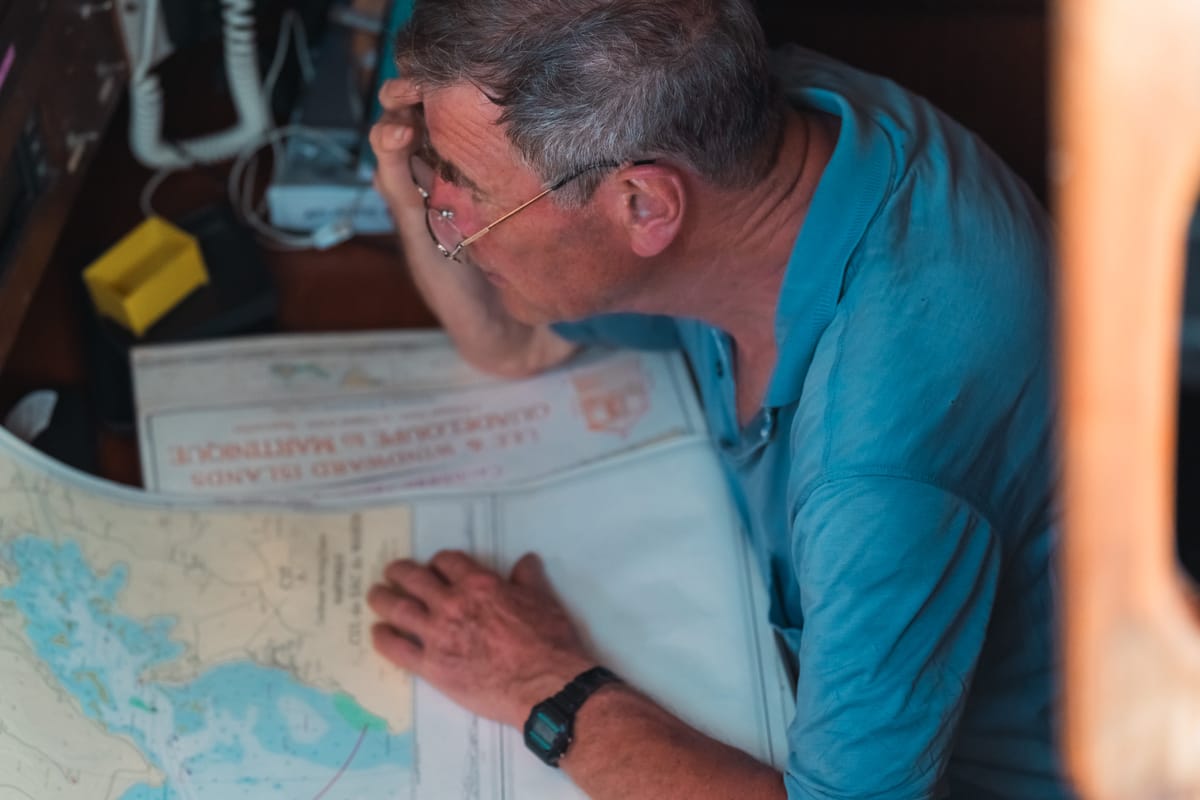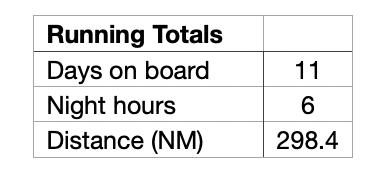Martinique is France, Mexico is America

We left early in the morning but not before breakfast, coffee and a chat about the plan. Shortly after setting off, James asked about my experience on the helm, it was a short conversation, he presented an opportunity to learn and so I took the wheel. The sailing was smooth for a while and then the water made the bow rise and land, rise and land, and then made the boat heel. The sea will do what it will, James had said. I'd been down below in the Solent in similar conditions and felt queasy, it is best to be on deck and see the horizon, sea sickness is caused by the difference between the signals sent to the brain from your inner ear and your eyes, if your eyes can see what your ears sense then it should be fine. After my stint on the wheel I went down to write the log and again felt queasy. I was wearing sea bands on my wrists which did not seem to work. Back on deck, the symptoms disappeared after a short while. I felt good at having sailed and wanted to do more. At lunch we ate the fruit and drank the juice a man in St Lucia had sold us from his boat, we had imagined the taste would be more intense than what we had experienced in the UK but it was the opposite, we concluded this was what real bananas and oranges were meant to taste like, and this papaya juice too.
On arriving in Martinique and dropping our mainsail we discovered a tear, we had a spare sail but James would not attempt the Atlantic without two good mainsails. He had made the crossing several times. We found a sailmaker a short walk from the mooring, Marie, she said Bonjour as she opened the door, we replied with Bonjour, and now we were in that dangerous territory faced by all English people, what next? We had replied Bonjour to be polite, to respect the local language but had laid ourselves a trap, she now thought we could speak French and it was her serve. Then it came. More French. She saw our defeated expressions and before the sentence finished switched to English. She made us no promises and we left our sails with her. Thinking it may take some time we found bread, cheese and wine—this was France. Marie fixed the sail within the morning and checked the spare, both were good for the crossing, she'd sailed the Atlantic herself. And so we readied to leave again.
In The Middle Passage, VS Naipaul had written,
Martinique is France. Arriving from Trinidad, you feel you have crossed not the Caribbean but the English Channel. The policemen are French; the street name-plates in blue-and-white enamel are French; the cafés are French; the menus are French and are written in a French hand. The landscape, in the south, is not stridently tropical. Rolling pasture land, worn smooth and unfruitful by cultivation, with dark blobs of scattered trees, and little claws and tongues of land sticking out into the clear sea, suggest a gentler Cornwall. Unlike the other islands, which have one main town to which everything gravitates, Martinique is full of little French villages, each with its church, mairie and war memorial (Aux Enfants de —— Morts pour la France), each with its history and its illustrious, for whose descendants pews are reserved in the church. The radio station announces itself as ‘Radiodiffusion Française’. The political posters – Voter Oui à de Gaulle (the referendum had taken place not long before) and Meeting de Protestation: Les Colonialistes Ont Assassiné Lumumba – are of metropolitan France and unlike anything else in the Caribbean. The tobacco kiosks stock Gauloises; and the advertisements are for Cinzano and St Raphael and Paris-Soir. Only, most of the people are black.
Our schedule meant we could not spend more than a day or so in each place. I wanted to see if Naipaul's Martinique was still here. People paid in Euros, posted their letters at La Poste, prayed in French, visiting a church, the Paroisse Saint Etienne du Marin, a magazine remembered the recently passed Pope, next to the church a war memorial, old streets with colourful houses with French signs but nearer the marina newly built flats, owned I was told, by people from France, holiday homes, but I did not have much time to meet the locals, we had made a plan to head to Guadeloupe, this meant leaving French territory to enter international waters and then back into France. I downloaded weather forecasts before we left and on reading the ones from the American NOAA (National Oceanic and Atmospheric Administration), James noticed the Gulf of Mexico had been renamed as the Gulf of America.
Logbook:

Until the next time thank you for reading and please share this post with friends,
Adnan
La Marina du Marin, Martinique, 2025
Adnan Sarwar is a philosophy student at the University of Oxford and a fellow of the Royal Geographical Society. He won The Bodley Head/Financial Times essay prize, edited for The Economist and is an Iraq war veteran of the British Army.
References
Naipual, V.S. (2011) The Middle Passage. London:Picador